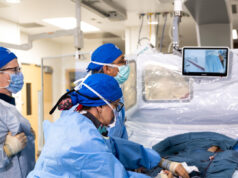 Saranas has announced results of SAFE-MCS, a multicentre clinical study evaluating the safety of complex high-risk percutaneous coronary intervention (PCI) using mechanical circulatory support (MCS) and surveillance with the Early Bird bleed monitoring system (EBBMS).
Saranas has announced results of SAFE-MCS, a multicentre clinical study evaluating the safety of complex high-risk percutaneous coronary intervention (PCI) using mechanical circulatory support (MCS) and surveillance with the Early Bird bleed monitoring system (EBBMS).
Babar Basir (Henry Ford Health System, Detroit, USA), co-principal investigator of SAFE-MCS, presented results of the trial as part of the late-breaking clinical trial sessions at the 2024 Cardiovascular Research Technologies (CRT) meeting (9–12 March, Washington, DC, USA).
“I am pleased to announce a significant reduction in BARC (Bleeding Academic Research Consortium) type III or V access site bleeds in patients monitored with the EBBMS was shown compared to the historical control (4.2% vs. 12.5% in PROTECT II) which corresponded to a relative reduction in risk of 66.3%,” noted Basir. “This study is the first of its kind to specifically evaluate bleeding complications in patients undergoing protected PCI, with independently adjudicated results. These findings are clinically significant and endorse the use of EBBMS for high-risk PCI patients who are receiving MCS support.”
The study enrolled 203 patients across multiple centres in the USA. Patients undergoing complex high-risk PCI with MCS via Impella (Abiomed) and transfemoral arterial approach were enrolled. The Early Bird Bleed Monitoring System was used in the ipsilateral femoral vein to monitor bleeding events after MCS removal.
“The SAFE-MCS study highlights the importance of prompt bleed detection and continuous monitoring to prevent severe complications and improve clinical outcomes, especially as the use of MCS increases globally,” stated Philippe Genereux (Morristown Medical Center, Morristown, USA) and co-principal investigator of SAFE-MCS. “We now have a deeper understanding of the frequency of bleeding events during such procedures with improved strategies to enhance patient safety during protected PCI.”
Approximately one in every five patients will experience a bleeding complication during large-bore endovascular procedures such as transcatheter aortic valve implantation (TAVI), endovascular aneurysm repair (EVAR), and percutaneous MCS. The average cost of a single bleeding complication incident across these large-bore procedures is approximately US$18,000 with an estimated US$729 million cost on the US healthcare system. The Saranas Early Bird bleed monitoring system is the first and only US Food and Drug Administration (FDA)-approved device for real-time monitoring of endovascular bleed complications.
“We would like to thank the excellent team of physicians and coordinators who contributed to the success of this study,” commented Mike MacKinnon, CEO and president of Saranas. “This represents an important advancement in our mission to continue building the clinical proof supporting the effectiveness of the Early Bird device. Saranas is dedicated to establishing a new benchmark for bleed detection during and after endovascular procedures, with the goal of improving patient outcomes and decreasing healthcare expenses overall.”










